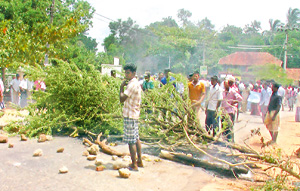Residents of the area blocked Palagala junction last week, demanding a solution for their Human-Elephant Conflict (HEC) issue. About 1,500 villagers gathered at this junction on July 20, protesting the death in the last two months of 7 villagers killed by elephants, according to media reports. Traffic from Kekirawa, Galewela and Mahawa was blocked, causing severe inconvenience to the public. The Department of Wildlife Conservation (DWC) had to assure the villagers that they would relocate the troublesome jumbos and for the protesting villagers to disperse.
 |
| Protesting villagers. Pic by Kanchana Kumara Ariyadasa |
This was not the first time villagers blocked roads in protest. It is now becoming a common occurrence to bring a victim’s body to the road or, to the Wildlife Field Office, demanding a remedy to their life-threatening issue.
Apparently, the Wildlife officers’ immediate solution is relocation of the elephant. But elephant expert Dr. Prithiviraj Fernando points out that the present form of mitigating the HEC is very much from the human perspective, and it only worsens the problem.
In the long term, it is detrimental to the very people it is meant to protect. He emphasises that people and politicians need to understand that translocation or elephant drives are not long term solutions.
Experts also point out that the DWC cannot be alone held responsible for the HEC. HEC is a very complex issue with multiple causes fuelling it, resulting in the annual loss of at least 200 elephants and 50 people.
Even though scientific evidence clearly indicates that translocations or elephant drives don’t work, the DWC opts for the easy way out, when political pressure and people pressure override scientific evidence.
Manori Gunawardena, another elephant conservationist also points out that elephant management decisions such as drives are politicized, and therefore, will not mitigate the conflict in the long term.
The DWC usually engages in HECs only after development plans have been drawn up. For example, the resettlement process in the North and East are under way, but elephant conservationists haven’t noticed any plan in place to minimise potential HECs.
Manori pointed out that the resettlement plan is based on land tenure, from as long ago as the early 80's. But most of these ‘original places’ became jungles and now a rich wildlife habitat. People have no choice but to settle there, in dense forest, along with leopards, bears, elephants etc. Nowhere in the resettlement process do they address the elephant factor, complains Manori.
She points out that the DWC lacks the capacity to assist and implement conflict mitigation at this level with the development authorities, which will create another warfront of HEC in North.
At a Stakeholder workshop on HEC, initiated by Born Free Foundation, it was pointed out that the protests were not regular and took place only if a next of kin was a victim.
It was pointed out that villagers were anything but cooperative of the DWC’s efforts at mitigation of HEC, preferring to sit it out on the sidelines, while expecting the DWC to go it alone. The villagers’ apathy towards cooperating with the DWC, even went to the extent of pilfering wires connected to the electrified fence, for its sale afterwards.
Sri Lanka has much scientific data to manage HEC, with the drafting of the National Policy for the Conservation and Management of wild elephants in Sri Lanka, several years ago. But this is yet to be implemented. Sri Lanka’s conservationists also had high hopes that the US$ 30 million World Bank (WB) loan for Ecosystem Conservation & Management Project would facilitate new conservation oriented programmes to alleviate HEC in the long term.
However, the Ministry of Finance informed the WB that this project did not address the development priorities of the government, and suggested modifications to the project design and the inclusion of additional activities which were not conservation oriented.
This resulted in the loan’s cancellation and with that went the efforts of the scientists.
HEC needs a well-planned conservation approach, and if the Government and the policymakers are not willing to address the problem in conservation terms, these kind of protests are inevitable. The DWC alone will not be able to provide a solution. |


